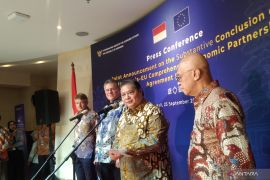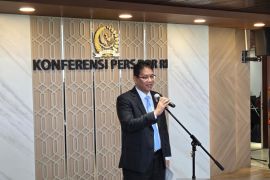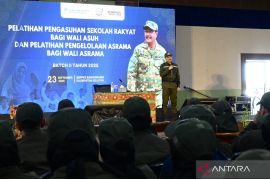"The key to increasing prosperity, solving labor disputes and improving work competence is social dialog. Workers and employers must have rooms for dialog and for seeking solutions to all problems," Minister Dakhiri said here on Sunday.
Companies or employers should also be encouraged to continue opening and promoting social dialog so that whenever a problem is arising it could be discussed and overcome in the negotiating table.
In welcoming the International Labor Day (May Day) on May 1, the manpower minister also reminded workers unions to encourage and assist their members in improving work competence so that they would not be trapped in a certain position for life.
"Competence must be increased so that workers would have continual stages of career from the lowest level to the upper ones. Once wage rate is raised, the wage must be adjusted to the workers competence and working time," the minister said.
He said that rallies staged by workers aimed to urge for a wage increase will not automatically be listened to.
"This will create a problem. Of the 125 million workforce, about 60 percent are elementary and lower secondary school graduates. If workers of elementary and lower secondary school graduates stage a demonstration to ask for salary hike, while their competence is not improving, then it will create a headache." the minister said.
Therefore, competence building issue should become the attention of workers associations and companies. Businesses should take part in seeking breakthroughs to improve the competence of those who are not yet employed through apprenticeship programs launched by the government, Dakhiri said.
The minister said last week that Indonesia would need 113 million skilled workers in 2030 to develop its potential to become the worlds seventh largest economy.
"It means that Indonesia needs to supply 3.7 million skilled workers per year," the minister stated at the ministrys apprenticeship program in Karawang, West Java.
A research of McKinsley Global Institute (MGI) in 2016 showed that Indonesia would need 113 million skilled workers for developing the potential to become the worlds seventh largest economy in 2030.
Hanif noted that in addition to the lack of skilled workers, majority of Indonesian work forces are high school graduates and many of them work in fields that did not match their educational background.
Therefore, the government has involved private sectors to increase the number of skilled workers, through the national integrated apprenticeship program in industries, he added.
"Participants of the program would get the benefit of increasing their working experience, developing working mental behavior, and increasing competence in accordance with market demand. This would become an important asset for someone to get a job or start working independently," he added.
The national apprenticeship, held in cooperation with the Employers Association of Indonesia (Apindo) and the Indonesian Chamber of Commerce and Industry (Kadin), involving 2,648 companies, is part of the governments efforts to improve its human resource quality.
During the apprenticeship program, industries would facilitate participants with work accident insurance, life insurance, and allowance.
The number of apprentice is expected to reach 163 thousand in 2017, higher than the total apprentice during 2009 to Nov 2016, which reached 169,137 participants only.(*)
Editor: Heru Purwanto
Copyright © ANTARA 2017











